If you are developing software, you need to review your code. This enables you to identify any problems with the code before you implement it. There are various ways to do this, but it’s well worth using a good quality code review tool to help keep your code review process organized and efficient.
What Is Code Review Tool?
During a code review, the author of the code gets another developer to check their code to make sure it is up to standard. This can involve them looking over your shoulder while you talk them through it, or it can be done in a more structured way.
Code review tools can be useful in helping teams collaborate on code while ensuring the consistency and quality of the code are kept up to standard. These tools not only provide structure to the review process but can also help make it quicker and easier for the team members to communicate, record the process, and keep track of everything they need to do.
6 Best Code Review Tools
Many code review tools are available, but I don’t want to overwhelm you with too many choices. So, here are 6 of the best.
GitHub
🏆 Best for developers that are already using GitHub.
GitHub is perhaps the most popular software development site. A lot of software gets developed on GitHub, and it is used by millions of developers globally, from small startups to large Fortune 50 companies.
GitHub’s code review tool is excellent if you are already on GitHub. However, it only supports Git repositories, so if you are developing your software away from GitHub, this is not the tool for you.
Key features:
- Configuration management — gives users control over application updates.
- Access control — administrators can control access to updates, releases, and changes.
- Easy-to-read dashboards with a graphical representation of current status.
- Deployment automation — automates the release to various platforms.
- Process analytics — for example, the time and cost of a process.
- Feature flags — for altering functionality without redeploying.
- Test customization — gain complete control over test types and parameters.
- Integrates with other developing and testing software.
GitHub has an average rating of 4.7 out of 5 stars from 1,907 reviews on g2.com. One recent 5-star reviewer said, ”From code sharing to continuous deployment, GitHub solves all the problems.”
Pros:
- Has a well-featured range of services that cater to many parts of the development life cycle.
- Works well with third-party services.
- User interface is easy to use.
- You can do private peer reviews with friends without exposing it to the public.
Cons:
- Version control can be challenging to use for a beginner.
- It only supports Git repositories hosted on GitHub.
CodeScene
🏆 Best if you want clear insights into potential code problems.
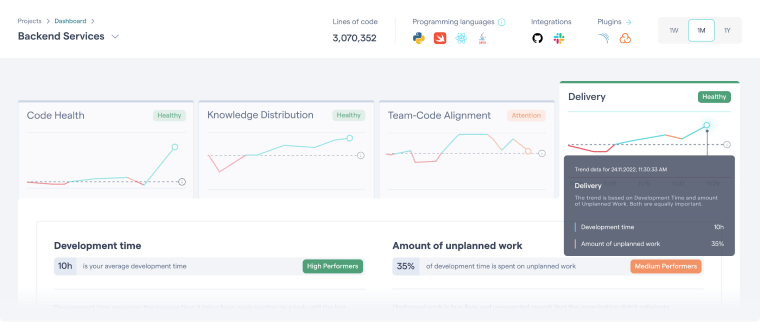
CodeScene is an extremely valuable code review tool that uses machine learning algorithms to help you find code issues early and fix them before they cause significant problems. It provides a lot of data, which some may find overwhelming, and there is a bit of a learning curve, but it can be well worth it.
Key features:
- Uses machine learning algorithms to identify social patterns and hidden risks in code.
- Maps hotspots in your codebase to pinpoint any bad code.
- Provides a goal-oriented workflow for planning improvements.
- Integrates with Jira for tracking trends in delivery performance.
- Works with any Git hosting.
- Available in two forms: cloud-based and on-premise.
CodeScene has an average rating of 4.8 out of 5 stars on g2.com, although this is only from 6 reviews. One recent 5-star reviewer said, ”Codescene is guiding us to write better code automatically.” Another reviewer wrote, ”As a Chief Architect, I get visibility into all teams, and the tech debt increase and decrease.”
Pros:
- Great integration with other tools.
- Helps you find code problems early and quickly.
- Provides clear instructions on fixing bad code.
- Get analysis at micro and macro levels.
Cons:
- There’s a bit of a learning curve.
- The amount of data can be overwhelming.
Gerrit
🏆 Best for reviewing code changes line by line.
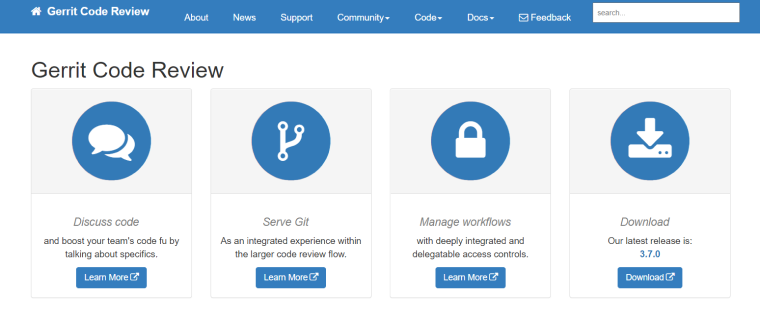
Gerrit is a free, open-source, web-based tool that combines a bug tracker and review tool into one. You can view all code changes side-by-side and start a discussion on any new line of code. This makes it easy for reviewers and developers to communicate effectively during development. It also integrates with many other tools. However, the documentation and support could be improved.
Key features:
- Free, open-source, web-based, with Git-enabled SSH and HTTP servers.
- Combines a bug tracker and review tool in one.
- Code changes are displayed side-by-side so that you can discuss every new line of code.
- Delegatable access controls enable you to manage workflows.
Gerrit gets an average rating of 4.2 out of 5 stars from 29 reviews on g2.com. One recent 5-star reviewer said, ”Great tool to drive code review and gating criteria for DevOps pipelines.” Another described Gerrit as an ”underrated project management tool.”
Pros:
- Easy integration with other tools.
- Side-by-side code comparison is very helpful.
- Reviewers and developers can communicate easily.
Cons:
- Documentation and community support could be better.
Crucible
🏆 Best if you want an Explorer-style overview of changes and discussions.
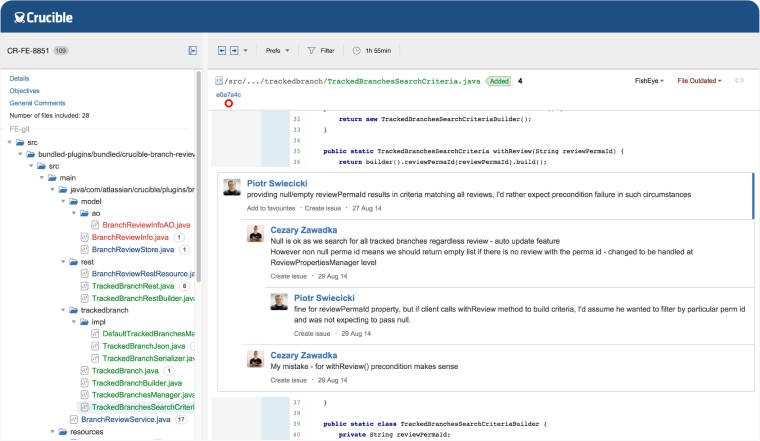
Crucible is a lightweight code review tool featuring threaded discussions, enabling your development team to review code, discuss changes, and identify issues with the code. It integrates with many other tools and provides a complete audit trail that shows all your code review details.
Key features:
- Review code, discuss changes, and identify bugs.
- Access all your code review details in a complete audit trail.
- Supports many version control systems such as Git, SVN, CVS, Perforce, and Mercurial.
- Integrates with Jira, Confluence, Atlassian’s Issue, Project Tracker, and Bitbucket
- It can be customized to integrate with other add-ons.
Crucible gets an average rating of 3.8 out of 5 stars from 26 reviews on g2.com. The most recent reviewer gave it 4 stars and said it has some features that are not available on many other similar platforms.
Pros:
- It displays a well-organized directory structure, highlighting the changed files.
- You can clean up old commits with one click.
- You can get a quick overview of the review status.
- Good integration with other tools.
- Great user interface with a nice dashboard.
Cons:
- It could be made more powerful by adding AI/ML features.
Review Board
🏆 Best if you are looking for a simple code review tool.
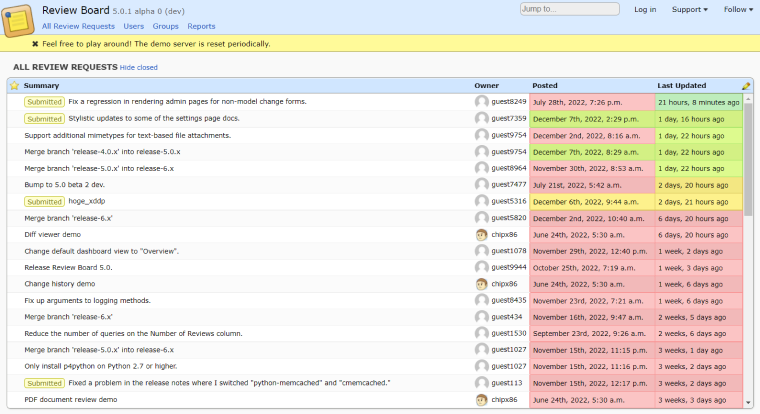
Review Board is a simple code review tool that you can host on your own server, which is ideal if you don’t want your code hosted publicly. It integrates with many version control systems and can also be linked to Amazon S3 for storing images. You can view a side-by-side comparison of code changes and can do both pre-commit and post-commit code reviews.
Key features:
- Integrates with many version control systems such as Git, CVS, Mercurial, Perforce, and Subversion.
- Can link to Amazon S3 to store screenshots within the tool.
- You can perform both pre-commit and post-commit code reviews.
- Side-by-side comparison of code changes.
- You can host it on your own server.
Review Board has an average rating of 4 out of 5 stars on g2.com. However, this is only from 8 reviews.
Pros:
- Great for reviewing code on a granular level.
- Simple tool without too many unnecessary options.
- Easy to use.
Cons:
- Reports generated after the code review do not contain any suggestions for best practices.
Rhodecode
🏆 Best for secure code development and review.
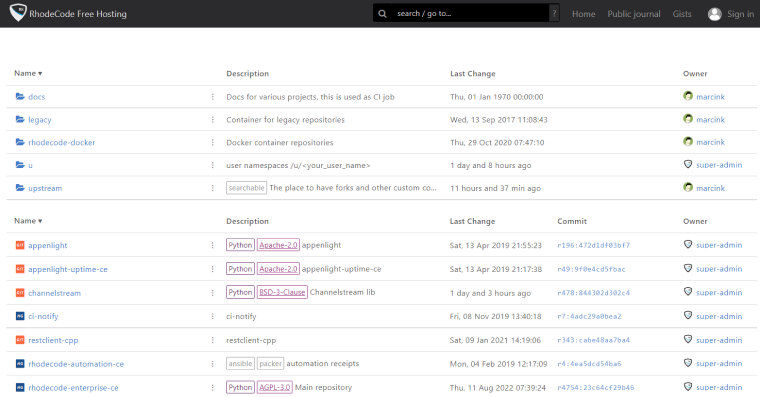
Rhodecode provides effective team collaboration with iterative, conversational code reviews and supports the version control systems Git, Mercurial, and Subversion. You can view project history across multiple branches thanks to the visual changelog, and it has secure development thanks to the permission management function.
Key features:
- Supports version control systems Git, Mercurial, and Subversion.
- Enables effective team collaboration with iterative, conversational code reviews.
- Permission management provides secure development.
- Visual changelog for viewing project history across multiple branches.
- Available in several versions:
- Cloud-based enterprise version: $8 per user per month
- On-premises enterprise version: $75 per user per year.
- Community edition: free and open source.
Rhodecode has an average rating of 4.1 out of 5 stars on g2.com. However, this is only from 4 reviews. One reviewer, who gave it 4.5 stars, said it is ”one of the best open-source code management platforms.”
Pros:
- User-friendly.
- Very secure.
- Nice community.
Cons:
- Workflow can be slow.
FAQ
The code review process helps identify code errors, increase code quality, and help developers learn the source code.
The four types of coding reviews are instant review, asynchronous review, synchronous review, and team review.
A code review should take a fixed amount of time so that you are not reviewing code while tired. Recommendations range from 60 minutes to 2 hours.
Often, other programmers will check each other’s code for any errors. However, you can hire a specialist company to conduct the code review process.
A highly competent code reviewer can earn anything from $45k to $121k per year, with it likely being around the $73k mark.
What is the Best Code Review Tool?
Overall, the best code review tool is GitHub. It’s used by millions of developers worldwide and has an average rating of 4.7 out of 5 stars from over 1,900 reviews.
However, it only works with GitHub, so if you are looking for a code review tool not tied to GitHub, you might be better off going for CodeScene.
One significant benefit of CodeScene is that it uses machine-learning algorithms to identify social patterns and hidden risks in code. This can dramatically speed up the code review process. However, it presents you with a lot of data, and the learning curve can be steep.

